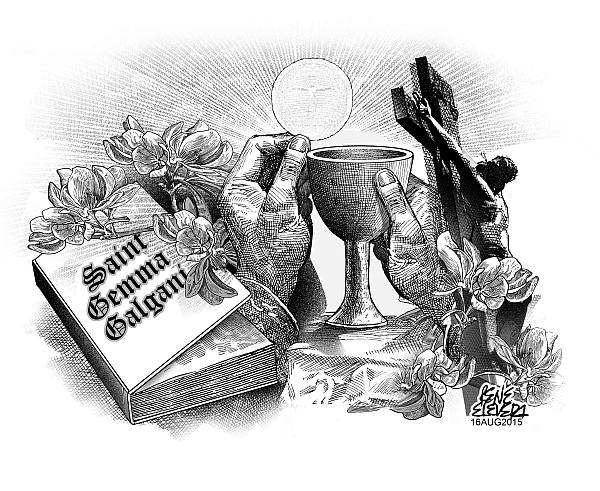I do this every Thursday. After a nap, I hie off to an adoration chapel, where the Blessed Sacrament is displayed, and there spend an hour of prayer.
This practice began after I read about St. Gemma Galgani, an Italian mystic who lived at the turn of the century.
Gemma made it a lifelong practice to spend an hour of prayer every Thursday night in honor of the agony of Jesus at Gethsemane. She said of her experience on her first Holy Hour one Maundy Thursday:
“I spent the whole hour praying, and weeping for my sins. Feeling weak I sat down. The sorrow continued, but after a little while I felt rapt in recollection. Shortly afterwards, I suddenly lost the use of my senses. I tried to get up and lock the door of my room. Where was I? I found myself in the presence of Jesus Crucified, blood flowing from His wounds. The sight filled me with pain. I lowered my eyes and made the sign of the Cross: I felt great peace of mind, but still intense sorrow for my sins. I had not the courage to look at Jesus. I bent down with forehead to the ground and remained so for several hours… when I came to myself the wounds of Jesus were so impressed on my mind that they have never since left it.”
Taking my cue from St. Gemma, I thought of at least taking an hour off of my every Thursday, the afternoon of which, as of every weekday, I almost always while away shooting the breeze with the wife in a nearby coffee shop. And the wife has decided to join me — we usually remind ourselves of this through a code – having coffee with a special friend.
This Thursday, however, I am alone. I had hoped to have the whole adoration chapel to myself, considering the sleep-ridden hour – two in the afternoon – but a pair of red pumps lie aligned outside the door, in accordance with instructions that footwear be left outside, out of respect for the Real Presence.
Real Presence? Yes. My faith tells me that, under the appearance of bread, in the consecrated host displayed inside a receptacle called the monstrance, Jesus is truly present. At his last meal with his disciples on the night before he died, Jesus instituted the sacrament of his Body and Blood. Matthew writes that “[w]hile they were eating, Jesus took bread, said the blessing, broke it and giving it to his disciples said, ‘Take and eat; this is my body.’ Then he took a cup, gave thanks, and gave it to them, saying, ‘Drink from it, all of you, for this is my blood of the covenant, which will be shed on behalf of many for the forgiveness of sins.’”
The Catholic Church affirms that, in the Eucharist, bread and wine become the Body and Blood of Jesus Christ through the power of the Holy Spirit and the instrumentality of the priest.
As Jesus said in the Gospel of John, “I am the living bread that came down from heaven; whoever eats this bread will live forever; and the bread that I will give is my flesh for the life of the world… For my flesh is true food, and my blood is true drink.”
The writer Flannery O´Connor regarded the Eucharist as central to her life. She wrote about a dinner which she had with friends. At one point, knowing her to be a Catholic, one of them mentioned the Eucharist, that it was just a symbol. To which O´Connor replied with not a little vehemence, “Well, if it’s a symbol, to hell with it.” O´Connor added that the Eucharist was “the center of existence for me; all the rest of life is expendable.”
Talking at length to Jesus in the Eucharist often leaves me wordless, if not heavy-eyed. To wind up the hour, I try recalling a sonnet by Pablo Neruda and reciting it.
Neruda meant it for a beloved, and definitely this was not Christ (Neruda was a communist). But I feel that at this moment it expresses my feelings to the Lord:
The light that from your feet rises to your hair,
the swelling that envelops your delicate form,
is not of mother of pearl, of bread beloved by fire.
Flour raised its harvest with you
and it grew encouraged by the fortunate age,
when the grains mirrored your breasts
my love was the coal working in the earth.
Oh bread your forehead, bread your legs, bread your mouth,
bread I devour and is born with light each morning,
beloved, flag of the bakeries.
a lesson of blood the fire gave you,
from flour you learned to be sacred,
and from bread the language and the aroma.
Disclaimer: The comments uploaded on this site do not necessarily represent or reflect the views of management and owner of Cebudailynews. We reserve the right to exclude comments that we deem to be inconsistent with our editorial standards.

